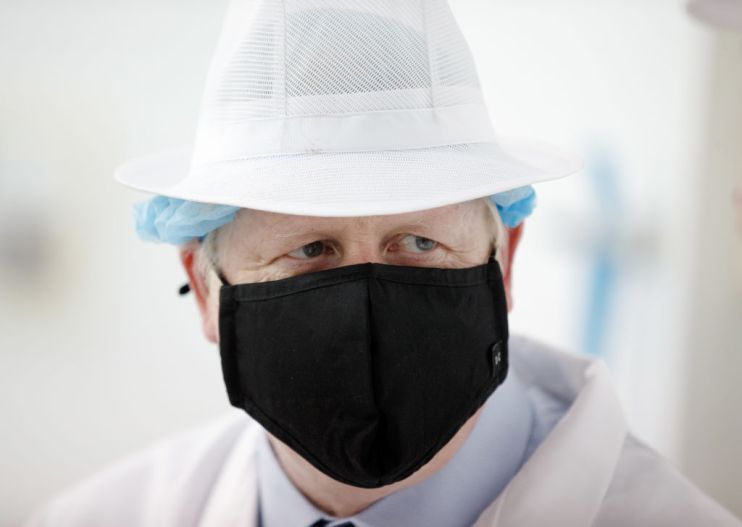After a year in the job, Boris Johnson is a disappointment to even his biggest fans

On the Institute of Economic Affairs’ Live With Littlewood show this week, I was asked to score Boris Johnson’s first year as Tory leader.
I am accustomed to being the token left-winger (relatively speaking) on the IEA’s show, which tends to feature economists and journalists who identify firmly on the Conservative right. I was therefore expecting my answer — a mere four out of 10 — to be the lowest by far.
In fact, I wasn’t far off from the undoubtedly more Conservative members of the panel — ranging from two to eight, the average score from a team of commentators who supported Boris for PM at some point was just 5.05, barely in positive territory.
Boris campaigned with a promise to “get Brexit done”; on 31 January 2020, the UK duly left the EU. He assured Tory voters that he would win an election; on 12 December 2019, the Conservatives won their biggest majority in over 30 years. He presented himself as a step-change from the monotonous inertia of Theresa May’s government — and say what you like about the man, but no one can accuse him of being dull.
In short, his first year as leader — an anniversary celebrated yesterday — has been a success on the terms by which he was elected. So why the disappointment?
Coronavirus has obviously thrown the government off course. A pandemic of a strange new virus sparking twin health and economic crises was going to be a challenge for any Prime Minister. Every world leader has struggled to balance slashing the infection rate with avoiding long-term damage to the economy and other public services. Some have fared better than others, but certain unavoidable factors — such as an ageing population, a large number of care home residents, and a hub airport that was serving over 200,000 international travellers every day before lockdown — were always going to place the UK at a disadvantage.
But even allowing for a standing start and for the Prime Minister’s grave illness in the midst of the crisis, the dissatisfaction on the panel was palpable. Fiscal hawks were up in arms about the seemingly endless spending splurges promised by the government’s newfound magic money tree, while loyal Conservatives raised concerns about Downing Street’s lack of action in February, before the pandemic had hit Britain, with warning signs missed in a fog of complacency.
What unites both these criticisms is a sense that the government is led by a man who is allergic to giving bad news and values popularity over leadership.
We may never fully understand the thinking in Whitehall leading up to lockdown on 23 March, but from the leaks and reports so far, it appears that the government was unwilling to acknowledge how severe this crisis would be — both in terms of potential deaths (with the notorious Imperial study finally moving the dial), and with regards to trade-offs. Even if comprehensive discussions were taking place behind closed doors, there were few public signs that the government was taking the risks seriously.
The Prime Minister’s televised address on 12 March where he sombrely warned the public to prepare to “lose loved ones” was glaringly out of step with his previous upbeat messaging — Pollyanna-esque talk of “squashing the sombrero” and singing Happy Birthday. Looking back, it is no wonder some have doubts about Downing Street’s grasp at the time of the looming crisis. Instead of planning and preparation, there is a sense that the aim was not to upset people.
When lockdown was introduced, simplistic sloganeering urged us to “stay at home, save lives, protect the NHS”. There was no acknowledgement that this endeavour might have its own costs: in the form of mass job losses, collapsing tax receipts, spiralling debt, damage to childhood development as millions were taken out of school, and indeed risk to life itself, with hundreds of thousands of excess deaths projected due to missed cancer diagnoses, increased domestic violence, and worsening mental health.
It may well be that such costs were necessary to avert a healthcare catastrophe, and that the long-term harms to health, education, public and private finances that are only just becoming apparent were a price worth paying to get the pandemic under control. But a government that refused to acknowledge the risks and trade-offs at the time and continues to play them down today looks either dishonest or incompetent.
More hardship is to come. As the furlough scheme is wound up, entire sectors are at risk of going under. The Treasury’s support schemes cannot save every job, and will have to be paid for by generations of future taxpayers. Interest rates are low enough for the government to borrow its way through now, but they won’t be forever.
At some point, there will be tough questions about tax rises or public service cuts — questions a responsible Prime Minister would be getting out in front of now, preparing the public and being honest about the state of nation’s finances.
Instead, Boris tells us that normality will be restored by Christmas.
As one former cabinet minister recently lamented, “the hard facts are that Boris is a good-time Prime Minister” . These are not good times. The PM has the majority and the mandate to make difficult decisions that are unpopular in the moment but crucial for the country’s future — yet he obfuscates, preferring instead to follow the polls and chase public approval.
That is his failing. And it’s why, even to his staunchest supporters, his first year as leader has been a disappointment.
Main image credit: Getty